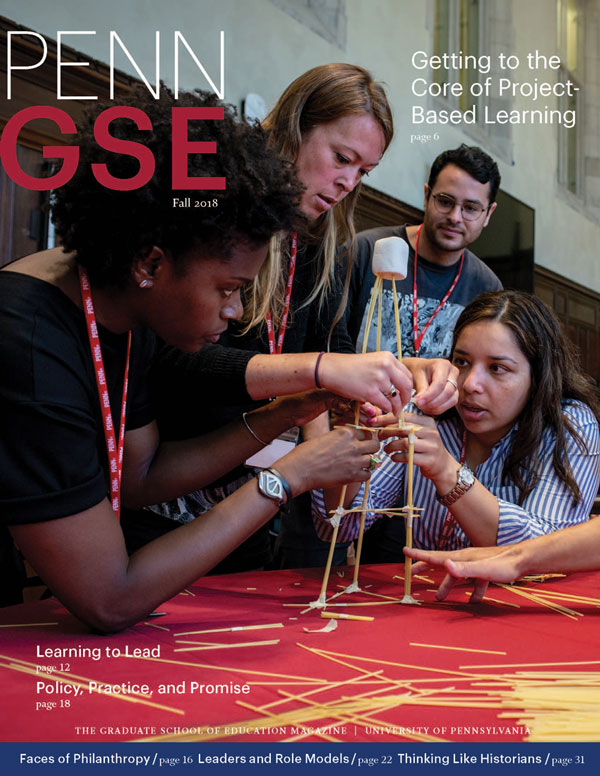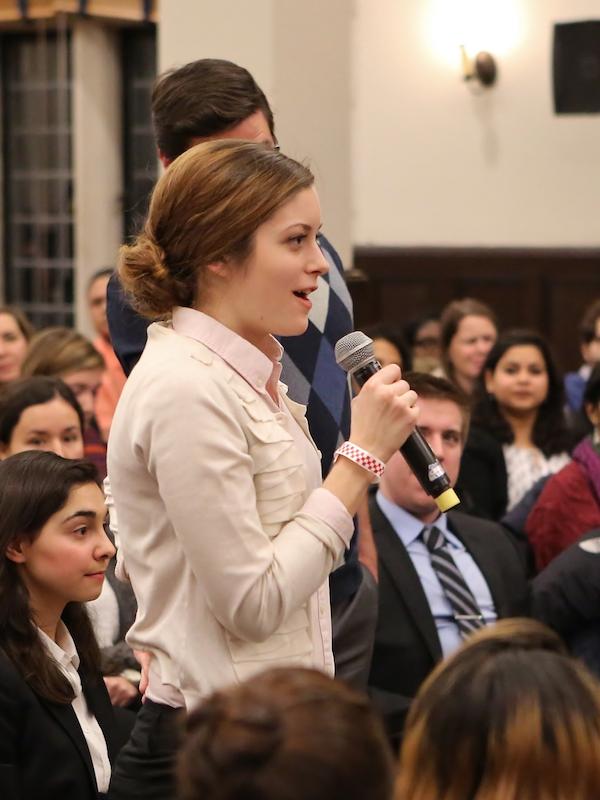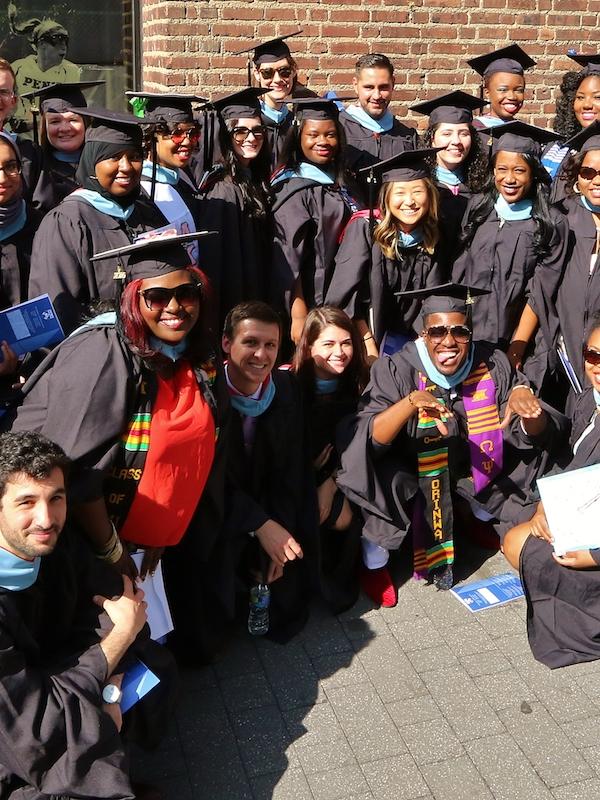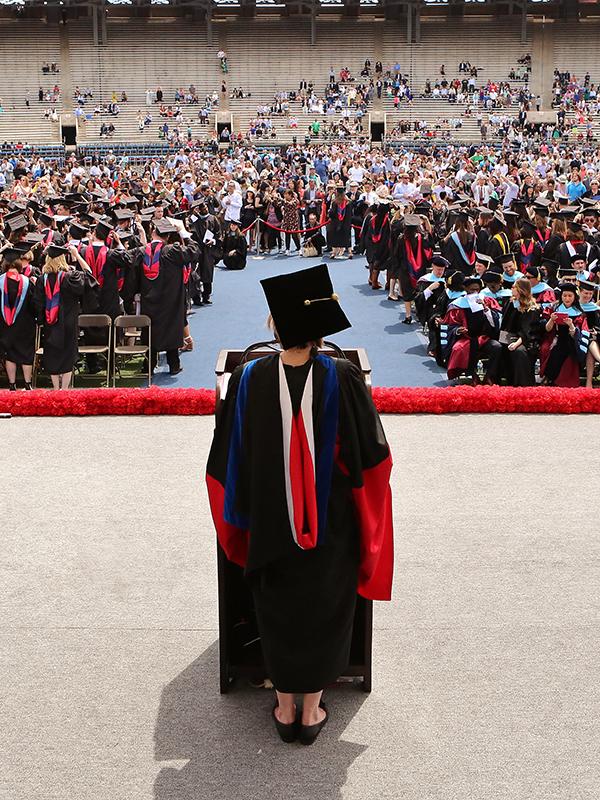Learning to Lead and Leading to Learn: Penn GSE Alumni as Senior Leaders at Penn
by Karen Brooks
Every year, Penn GSE produces graduates who go on to influence higher education nationally and internationally as teachers, entrepreneurs, thought leaders, college presidents, and more. This includes alumni who shape the field without leaving their very own Ivy League alma mater. At Penn, employees who are GSE graduates put their skills to use within the University in a variety of ways. Here, we highlight five “home-grown” senior leaders at Penn who draw upon expertise they acquired in Penn GSE’s Higher Education division as they achieve professional success and make an impact on the nation’s higher education landscape.
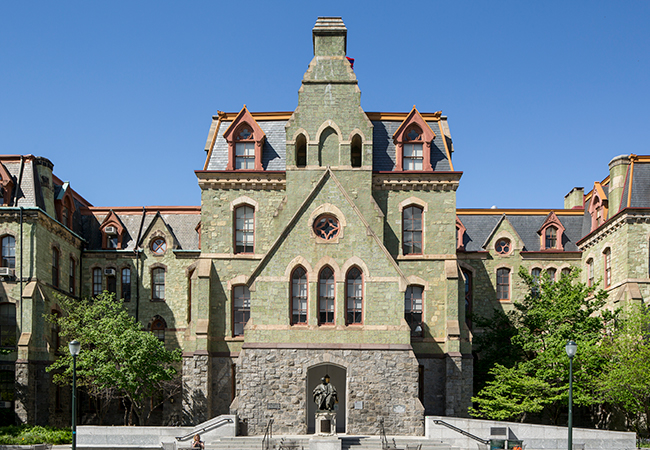
Putting Penn Graduates to Work
Seven years into her work as a college career counselor, Barbara Hewitt, GRD ’02, sought to deepen her knowledge of higher education institutions and the ever-evolving trends that affect them. She applied to Penn GSE’s Doctor of Education in Higher Education Administration program to achieve just that.
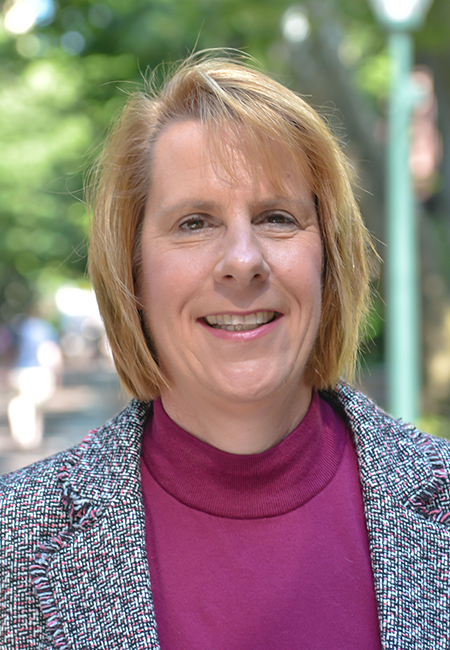
“Universities are very complex and diverse places, and there were a lot of things I wanted to learn about accessibility, costs, tuition rates, and technology’s role in education,” recalls Hewitt, who had been working in career services at her undergraduate alma mater, Dickinson College. Serendipitously, a position that involved working with undergraduates in the College of Arts and Sciences opened in Penn Career Services just as Hewitt was accepted to GSE. She got the job, becoming a Penn student and employee at the same time.
Twenty years later, Hewitt is executive director of career services at Penn, a role to which she was promoted in August. Although she started her Penn career working with liberal arts students, she has spent the majority of her tenure as senior associate director of career services for the Wharton School, advising undergraduates throughout their job searches and managing a recruiting program that has included four hundred employers and thirteen thousand interviews per year. In her new role, she oversees career services operations for all Penn undergraduates and nine graduate schools. “I love having one foot in academia but also being involved in what’s happening with the larger economy,” she says. “We have to keep up with national trends in employment, and when a recession hits or a new work-related technology comes up, we keep students informed and prepared. It’s a great mix of education and what’s happening in the wider world.”
Hewitt’s dissertation focused on how academic achievement, extracurricular activities, and work experience influenced new graduates’ success in obtaining job interviews and offers. “It was nice to pursue my doctorate while working in this field as an employee; the things you learn are not so theoretical when you are coming to work every day and seeing the challenges institutions are facing,” she says. “I applied what I was learning in my degree program to my job all the time.”
Her new position requires her to shape career services programs institution-wide so they best meet the needs of all Penn students and graduates—an opportunity she finds particularly appealing. “At the end of the day, all of us at Penn want our students and alumni to achieve fulfilling careers. It’s nice to be a part of that process,” she says.
Matching Talent with Opportunity
Jack Heuer, G’92, GRD’03, was all in when he learned that GSE professors Bob Zemsky and J. Douglas Toma wanted to introduce an Executive Doctorate in Higher Education Management program for senior leaders.
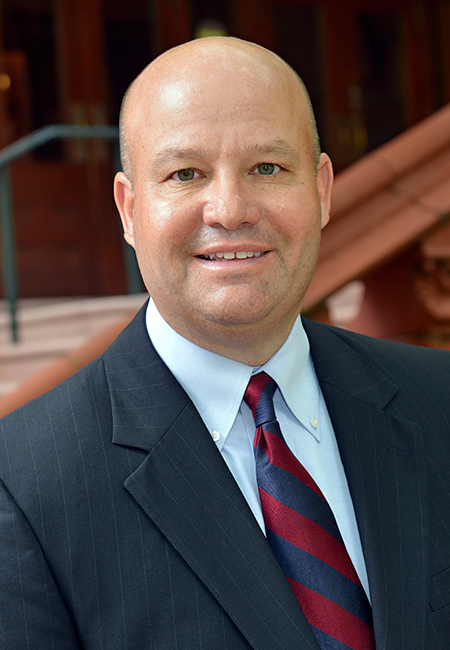
Currently vice president of human resources, Heuer had been working in HR at Penn for nearly twenty years when he joined the Executive Doctorate program’s first cohort in 2002. While he possessed expertise in the field of HR, he wanted to have a deeper understanding about the business of higher education.
“Before the Exec Doc program, I did not comprehend the broad spectrum of University operations such as the University’s development function and the role of the alumni relations staff. The program taught me how to be a better HR professional, but more importantly, it made me a better higher education professional,” says Heuer, who oversees all facets of HR administration at Penn, the largest private employer in the Philadelphia region. Last fiscal year, his teams managed 2,397 hires across the institution.
Heuer’s responsibilities vary significantly, but his primary focus is on recruitment, training, and compensation for Penn’s 11,400 staff employees as well as benefits and quality of work life programs for all faculty and staff. He takes an interest in furthering staff health and wellness, as well as work-life balance initiatives. To promote communication with staff at all levels, he hosts monthly “Chats with Jack”—small-group meet-and-greets during which he welcomes both positive feedback and constructive criticism on Penn’s current practices.
“We in HR don’t want to be enforcers; we want to be enablers who help people define their own careers and lives,” he says. Heuer’s Penn GSE experiences continue to inform his work. For example, he greatly valued the program’s cohort model, which allowed him to form strong relationships with his classmates as part of a group who experienced the entire program together. He wanted leadership development activities at Penn to nurture similar bonds. This inspiration, combined with his dissertation research on talent management in higher education, led to the development of a program for high-potential senior staff.
“The Exec Doc program’s cohort-based design and my dissertation research provided a roadmap for Leadership@Penn, which has been a great success,” says Heuer, who also has a master’s degree in organizational dynamics from the Penn College of Liberal and Professional Studies and whose wife, Lisa J. Heuer, GED’92, is also a Penn GSE graduate.
“I feel fortunate to be able to apply the knowledge I gained at GSE to benefit the University,” he says. “It was an honor to be part of that very first cohort, and it is a privilege to be at Penn now.”
Turning Data Into Knowledge
Every day, Stacey Lopez, GRD ’11, comes to work and uses data to tell stories. As Penn’s associate vice president for institutional research and analysis, Lopez heads the office that collects and distills information on anything and everything related to Penn students, faculty, and staff.
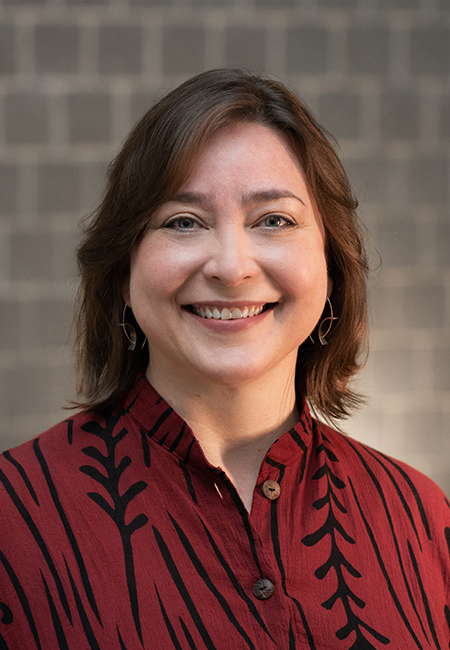
“We play the role of institutional mirror, reflecting the University back through quantitative metrics to show both positive trends and opportunities for improvement,” says Lopez, noting that the data that comes out of “IR”—as institutional research is known by higher education insiders—supports planning and decision-making in areas as diverse as admissions, curriculum, staffing, student life, finances, facilities, and alumni relations. The office also coordinates reporting to state and federal entities, accrediting agencies, and other organizations.
Lopez has worked in IR for seventeen years after a “first career” teaching mathematics and statistics at Wichita State University, a background that has served her well since her current field demands an ability to translate numbers into meaningful facts. The recent emergence of “big data” has generated an unprecedented demand for institutional analysts as technology allows organizations to collect and store more information about their business than ever before. Some have called data “the new oil.” While Lopez agrees, she takes the analogy a step further. “Very few people would know what to do with a barrel of raw crude oil—it is necessary to refine that oil before it can be turned into energy,” she explains. “I see IR as playing a role similar to the refinery for the institution—we take raw data and turn it into useful information that can support the decision-making process.”
“The wealth and variety of students and faculty at Penn provide a rich landscape to do the research that we do, and it is interesting to see how we are similar to peer organizations versus what makes us uniquely Penn.” —Stacey Lopez, GRD ’11, associate vice president for institutional research and analysis
A few years after arriving at Penn in 2007, Lopez enrolled in GSE’s Executive Doctorate in Higher Education Management program. While her bachelor’s and master’s degrees in mathematics and statistics and her second master’s degree in industrial engineering provided her with the technical skills to succeed in IR, they did not offer insight into the higher education landscape. Lopez felt she could better serve the University if she understood its place among its peers.
She reports that one of her most powerful experiences in the program was a study abroad trip to South Africa. The opportunity to compare and contrast another country’s educational issues with those back home improved her understanding of the challenges universities face and deepened her appreciation for her position.
“The wealth and variety of students and faculty at Penn provide a rich landscape to do the research that we do, and it is interesting to see how we are similar to peer organizations versus what makes us uniquely Penn,” she says. “At the end of the day, IR is a service organization, and this is a fascinating place to serve.”
Minding Penn’s Business
Christopher Bradie, W’92, G’04, GRD’12, was five years old when he attended his father’s college commencement ceremony. Captivated by the graduates marching in academic regalia as their families beamed with pride, he vowed right then that he too would go to college.
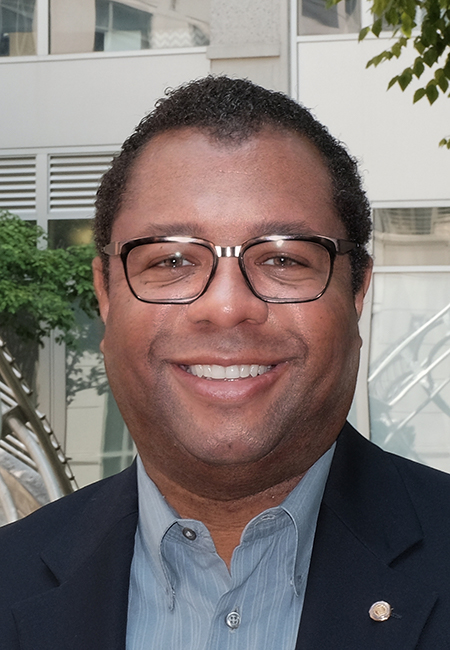
“Being on this picturesque campus with all of these people on the happiest day of their lives is my earliest childhood memory. I got indoctrinated in the importance of higher education,” says Bradie, who holds three degrees from Penn: a bachelor’s in economics from the Wharton School, a master’s in organizational dynamics from the School of Arts and Sciences, and a doctorate from Penn GSE, where he attended the Executive Doctorate in Higher Education Management program. He began working for the University in 1994 and has served as associate vice president for business services since 2007.
During his undergraduate experience at Wharton, he spent two years as an intern with the Business Services Division. “It was enlightening to see the administrative side of the University. I always felt that if more students knew what went on behind the scenes, they would be even prouder of the institution, observing all the care and energy that goes into running it every day,” he says. Bradie soon returned to Penn after graduation as a buyer for the Penn Bookstore. He gradually climbed to his current role, which involves ensuring twenty different departments and programs meet the needs of the campus community. These individual business units provide a wide range of services spanning retail, housing, dining, hotels, and parking.
“My role allows me to be a bit of an entrepreneur within Penn. I work with corporate partners to make sure the services we provide or that companies offer here match what faculty, staff, and students are looking for,” he explains. “Say Amazon or Uber or a bank wants to have a presence on campus—I work with other campus leaders to determine whether they are offering services that our community wants and then work to develop revenue-generating programs for the University.”
Bradie says his master’s curriculum at SAS helped him understand universities’ organizational culture, but his GSE program enriched his professional skills even more.
“Even though I had spent almost my entire working career in higher education, I didn’t understand how multifaceted it is,” says Bradie, whose dissertation examined how universities make outsourcing decisions. “Working so closely with faculty members and conducting my own original research gave me a new appreciation for the audiences I serve. GSE taught me what it means to truly be a University citizen, and now I understand why and how faculty do what they do and how I can best support them.”
Keeping Alumni Connected
Penn has approximately three hundred thousand graduates spread around the world. Hoopes Wampler, GRD ’13, wants to engage all of them—a goal he acknowledges is a tall order. As associate vice president of alumni relations, Wampler oversees alumni outreach efforts University-wide.
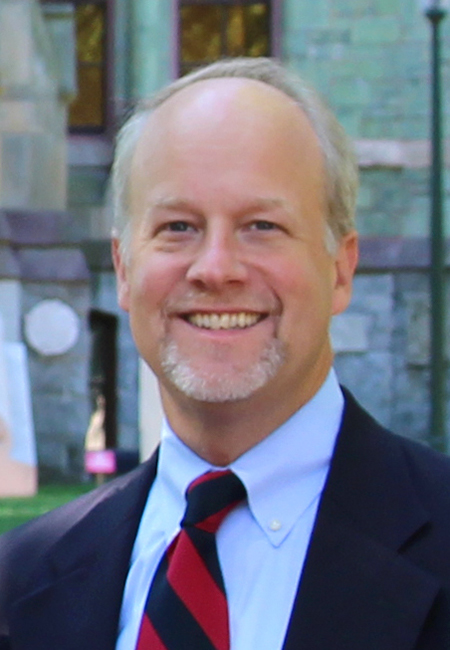
“My job is never done, but the great thing is that it’s one-hundred percent about relationships, and every day I advance at least one in some way,” says Wampler, who spent a decade working in undergraduate alumni relations at Harvard. There he earned a master’s degree in higher education administration before coming to Penn in 2007. Since then, he has doubled Penn’s alumni engagement.
To keep graduates connected, Wampler and his team manage traditional programming like Alumni Weekend (which last year drew a record-setting thirteen thousand attendees), class reunions, and Penn’s 130 regional organizations and clubs. They also introduce new services like career development, young alumni gatherings, and alumni education—an area that has taken off in recent years.
“All Penn alumni have one thing in common: they came here for the academic and intellectual experience. Our office works hard to make sure Penn remains their intellectual home for life,” says Wampler. He points to growth in massive open online courses (MOOCs) as a significant development that allows his team to expand alumni access to Penn courses and customized alumni education programs.
Wampler enrolled in Penn GSE’s Executive Doctorate in Higher Education Management program to expand his perspective on higher education. He used his dissertation to explore young alumni engagement, a “hot topic” in the field.
“I rely on the research, analysis, and psychology I developed at GSE to better understand how to connect young alumni to the institution,” he says. “Although they’ve just had an incredible university experience, often young alumni do not naturally stay connected to their alma mater. GSE taught me how to think through this challenge strategically,” he says.
Becoming a member of the constituency he serves has also benefited Wampler. “Knowing what it’s like to be a student here has given me important insight and credibility among our alumni,” he says. He recalls that his cohort of twenty-four classmates “helped each other, laughed and cried together, celebrated and commiserated together, and worked hard together,” noting that the friendships he established at GSE went beyond his peers.
“I also built incredible relationships with the professors, all of whom are successful, important people in the higher education space. It’s a privilege to now be able to consider them both colleagues and friends,” he says.
This article originally appeared in the Fall 2018 issue of The Penn GSE Magazine.

